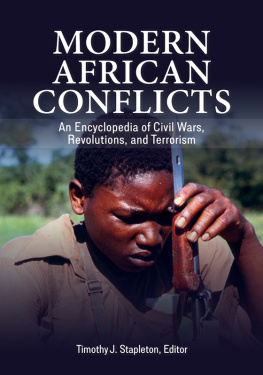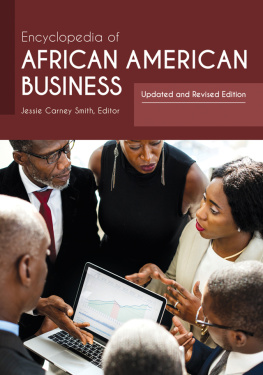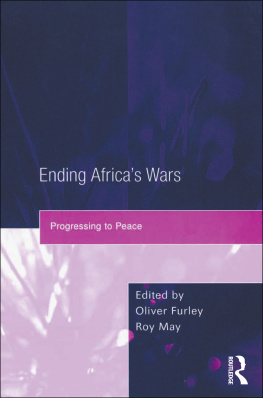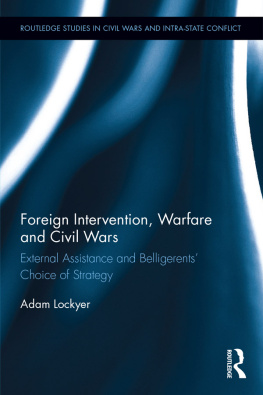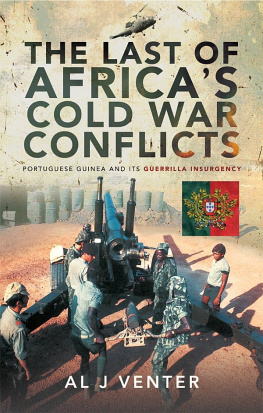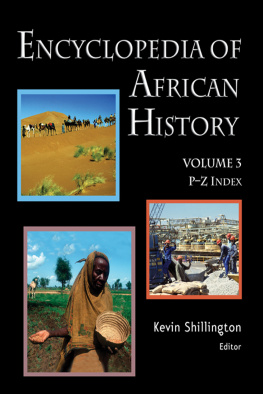Modern African Conflicts
Modern African Conflicts
An Encyclopedia of Civil Wars, Revolutions, and Terrorism
Timothy J. Stapleton, Editor

Copyright 2022 by ABC-CLIO, LLC
All rights reserved. No part of this publication may be reproduced, stored in a retrieval system, or transmitted, in any form or by any means, electronic, mechanical, photocopying, recording, or otherwise, except for the inclusion of brief quotations in a review, without prior permission in writing from the publisher.
Library of Congress Cataloging-in-Publication Data
Names: Stapleton, Timothy J. (Timothy Joseph), 1967 editor.
Title: Modern African conflicts : an encyclopedia of civil wars, revolutions, and terrorism / Timothy J. Stapleton, editor.
Description: Santa Barbara, California : ABC-CLIO, An Imprint of ABC-CLIO, LLC, [2022] | Includes bibliographical references and index.
Identifiers: LCCN 2022002046 (print) | LCCN 2022002047 (ebook) | ISBN 9781440869693 (hardcover) | ISBN 9781440869709 (ebook)
Subjects: LCSH: Civil warAfricaHistoryEncyclopedias. | RevolutionsAfricaHistoryEncyclopedias. | TerrorismAfricaHistoryEncyclopedias. | AfricaHistory, MilitaryEncyclopedias. | AfricaPolitics and government1960
Classification: LCC DT21.5 .M63 2022 (print) | LCC DT21.5 (ebook) | DDC 355.0096dc23/eng/20220208
LC record available at https://lccn.loc.gov/2022002046
LC ebook record available at https://lccn.loc.gov/2022002047
ISBN: 978-1-4408-6969-3 (print)
978-1-4408-6970-9 (ebook)
26 25 24 23 22 1 2 3 4 5
This book is also available as an eBook.
ABC-CLIO
An Imprint of ABC-CLIO, LLC
ABC-CLIO, LLC
147 Castilian Drive
Santa Barbara, California 93117
www.abc-clio.com
This book is printed on acid-free paper 
Manufactured in the United States of America
Contents
EVENTS
IDEAS, ISSUES, AND MOVEMENTS
INDIVIDUALS
ORGANIZATIONS
Armed conflicts represent a substantial part of African history since around 1960. Conquered by European powers during the late nineteenth and early twentieth century, most African colonies transformed into independent states during the late 1950s and 1960s. Many factors contributed to the decolonization of Africa, including the postWorld War II weakness of European colonial powers, the development of a bipolar world order dominated by two officially anti-colonial superpowers (the United States and the Soviet Union), the rise of an international anti-colonial movement, including newly independent countries in Asia and the protests of African nationalists within the colonies. While most African countries gained independence through a process of negotiation between outgoing European colonial regimes and African political leaders, some parts of Africa experienced protracted anti-colonial wars. Together with the Suez Crisis of 1956 that subordinated the colonial powers to the new superpowers, anti-colonial struggles fought in Kenya, Madagascar, Cameroon, and Algeria during the 1950s informed wider British and French decolonization across the continent. However, the unwillingness of Portugal to withdraw from Angola, Mozambique, and Guinea-Bissau as well as the continuation of white settlerminority regimes in Southern Rhodesia (now Zimbabwe), South West Africa (now Namibia), and South Africa led to insurgencies in these territories that began in the 1960s and ended at various times from the 1970s to the early 1990s. Corresponding with the decolonization era, especially from around 1960, the global Cold War superimposed itself on many of these conflicts, with the United States and its Western allies providing direct or indirect support for the remaining colonial/settler states and the Soviet Union and the Eastern Bloc assisting African liberation movements.
Postcolonial African conflicts were/are either interstate wars or civil wars or sometimes both. Direct warfare between African states (interstate wars) remained uncommon in independent Africa. The Organisation of African Unity (OAU), formed in 1963 as a compromise between Pan-Africanist leaders such as Kwame Nkrumah of Ghana who wanted unification and others such as the presidents of the former French colonies who remained close to France, maintained a policy of safeguarding the borders imposed on Africa during the colonial era and inherited by the postcolonial states. In addition, impoverished African states built armed forces, including new air forces and navies but often lacked the resources to engage in protracted conventional warfare without external assistance. Nevertheless, a number of state versus state wars occurred in postcolonial Africa. Although the scale and intensity of operations varied, brief wars ranging from a few days to a few months took place between Algeria and Morocco in 1963, Libya and Egypt in 1977, Ethiopia and Somalia in 19771978, Tanzania and Uganda in 19781979, and Burkina Faso and Mali in 1985. The few protracted interstate wars, lasting several or more years, included apartheid South Africas constant armed incursions into southern Angola from 1975 to 1988, Libyas military operations in northern Chad during the 1970s and 1980s that culminated in the 1987 Toyota War and the Eritrean-Ethiopian War of 19982000. Furthermore, Egypt played a central role among the Arab powers in the Arab-Israeli conflicts of 1948, 1956, 1967, and 1973. Africas most complex interstate wars took place in Zaire/Democratic Republic of the Congo (DRC) in the late 1990s and early 2000s. This began with the First Congo War of 19961997 when Rwanda, Uganda, and Angola invaded Zaire (DRC) to overthrow the Mobutu regime. The situation escalated during the Second Congo War of 19982002, also called Africas World War, when Rwanda and Uganda invaded DRC where the new government called on direct military assistance from Angola, Namibia, and Zimbabwe.
Civil wars became the most common form of armed conflict in postcolonial Africa. Upon independence, African states inherited borders imposed by European colonial conquest, and these often ignored important factors around physical or human geography. Divided by colonial and postcolonial borders, some large African ethnic groups live in different countries such as Somalis in Somalia, Kenya, Ethiopia, and Djibouti; Bakongo in Congo-Brazzaville, Congo-Kinshasa (DRC), and Angola; and Kalanga in Botswana and Zimbabwe. In West Africa, since European invaders arrived on the coast and advanced inland, many independent states include a southern coastal and forested region inhabited by Christians and a hinterland Savannah and Sahel region inhabited by Muslims. While the physical and human geography of West Africa reflects long west-east strips such as the coastal forest and the interior Sahel, the colonial powersimposed political borders comprise a south-north axis cutting across ethnicities, religions, and environments. Additionally, colonial rule and colonial economies created regional disparities in Africa, with some areas within a country becoming relatively prosperous and others marginalized, and the colonial powers ethnic divide-and-rule policies exacerbated tensions. Given these factors, African states experienced a series of regional secessionist movements almost immediately after independence, with some of these conflicts continuing for many years or decades. Regional secessions led to the Congo Crisis of 19601963, the Nigerian Civil War of 19671970, the First Sudan Civil War of 19551972, a series of interrelated conflicts within Ethiopia from the 1960s to 1991, periodic Tuareg rebellions in northern Mali and Niger from the 1960s to the 2010s, and the crisis in Southern Cameroon that began in 2016. Lesser-known but persistent separatist conflicts in independent Africa include those in the Cabinda Enclave of Angola from 1975, the Casamance region of Senegal from 1982, and the Caprivi Strip of Namibia from 1994. Due to the many secessionist movements in postcolonial Africa, the hostility of the OAU (renamed African Union from 2002) and its member states limited their success to two cases. Eritrea gained independence from Ethiopia in 1991 in circumstances related to end of the Cold War, and South Sudan seceded from Sudan in 2011 within the context of the American-led War on Terror. Somaliland broke away from the civil warravaged Republic of Somalia in 1991, but the former failed to gain international recognition. Aside from secessionist movements, regionalism and overlapping factors like ethnicity and religion influenced other civil wars in postcolonial Africa. In Uganda, southern rebels fought a northern-dominated state in the early to the mid-1980s, and northern rebels fought a predominantly southern government from the late 1980s to the mid-2000s. From the 1960s, Chad experienced a series of civil wars between governments based in the south and supported by France and rebels based in the north and backed by Libya. After Angolas 1975 independence from Portugal, the rebel group with access to the capital took power, forming a state, but faced armed opposition from other insurgent forces in the north and south. Similarly, violence between southern-based governments and northern rebel forces broke out in Cte dIvoire and the Central African Republic (CAR) during the 2000s. In some cases, African groups favored by the colonial rulers faced retribution and overthrow after independence. In Rwanda, where Belgian colonial officials favored the Tutsi minority, Hutu leaders overthrew the Tutsi officials in 1959, ushering in a Hutu-majoritarian republic eventually eliminated by predominantly Tutsi exiled rebels who invaded in 1990 and took over during the genocide against the Tutsi in 1994. Conversely, in Burundi, a Tutsi military regime emerged in 1965, clung to power by exterminating potential leaders among the Hutu majority in the 1972 genocide, and faced an insurgency by Hutu rebels in the 1990s and 2000s that led to political change and a predominantly Hutu government. During the late 2000s and 2010s, a combination of influence from international Islamist extremism, deep regional marginalization, and ineffective governance led to insurgencies in West Africas Sahelian hinterland, including parts of Mali, Niger, Burkina Faso, and northeastern Nigeria. In roughly the same areas, desertification accelerated by climate change informed violence between herding and farming communities over a decreasing amount of useable land. In many of these examples, and since the decolonization era, rival African states attempted to undermine each other by backing rebel groups in each others territories. For instance, Zaire (DRC) backed rebels in northern Angola, and Angola hosted insurgents from southern Zaire during the 1970s, and Uganda supported rebels in southern Sudan during the Second Sudan Civil War (19832005), and in turn, Sudan sponsored insurgents in northern Uganda.

